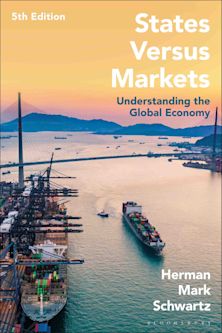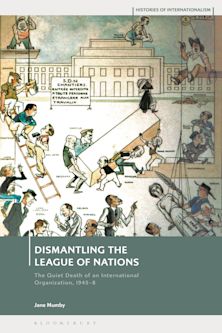- Home
- ACADEMIC
- Politics & International Relations
- International Relations - Other
- The Great Catalyst
The Great Catalyst
European Union Project and Lessons from Greece and Turkey
Bülent Temel (Anthology Editor) , Christina Akrivopoulou (Contributor) , Basil Dalamagas (Contributor) , George Dourakis (Contributor) , Aylin Ege (Contributor) , Doga Ulas Eralp (Contributor) , Cengiz Erisen (Contributor) , Elif Erisen (Contributor) , Serdar Güner (Contributor) , Gül Ertan Ilal (Contributor) , Ersin Kalaycioglu (Contributor) , Demet Yalçin Mousseau (Contributor) , Ilhami Alkan Olsson (Contributor) , Hayriye Özen (Contributor) , Panayis Panagitopoulos (Contributor) , Panagiotis E. Petrakis (Contributor) , Vassilis Vamvakas (Contributor) , Christoforos Vernardakis (Contributor) , Grigoris Zarotiadis (Contributor)
The Great Catalyst
European Union Project and Lessons from Greece and Turkey
Bülent Temel (Anthology Editor) , Christina Akrivopoulou (Contributor) , Basil Dalamagas (Contributor) , George Dourakis (Contributor) , Aylin Ege (Contributor) , Doga Ulas Eralp (Contributor) , Cengiz Erisen (Contributor) , Elif Erisen (Contributor) , Serdar Güner (Contributor) , Gül Ertan Ilal (Contributor) , Ersin Kalaycioglu (Contributor) , Demet Yalçin Mousseau (Contributor) , Ilhami Alkan Olsson (Contributor) , Hayriye Özen (Contributor) , Panayis Panagitopoulos (Contributor) , Panagiotis E. Petrakis (Contributor) , Vassilis Vamvakas (Contributor) , Christoforos Vernardakis (Contributor) , Grigoris Zarotiadis (Contributor)
You must sign in to add this item to your wishlist. Please sign in or create an account
Description
For over half a century, European Union has been a promising endeavor of cooperative institutionalism. It has shown that even nation states with a long history of conflict are capable of collaborating with one another to serve their own interests. However, the EU project has also made visible that there is no one-size-fits-all policy in economics that can be applied to all countries with success. Economics starts and ends with the society. Common culture determines the outcomes of economic policies, and ordinary people pick up the bill when policies turn out to be failures.
This book presents two different tales of the European Union to provide an empirical challenge to oversimplified assumptions behind the neoliberal orthodoxy in policymaking: Favorable experience of the EU-candidate Turkey, and the regrettable venture of the EU-member Greece. The fact that these two neighboring countries with similar cultures have had vastly different experiences with the European Union suggests that the EU functions as a catalyst of change in the countries that associate with it, but this impact could be negative as well as positive depending on the role the EU plays. Political economist Bülent Temel presents a lucid analysis of the Turkish and Greek encounters with the EU—based on contributions from a diverse range of social sciences; economics, game theory, finance, political science and sociology.
Table of Contents
Chapter 1: Greece and the Eurozone: Staying or Leaving?
Panagiotis E. Petrakis
Chapter 2: Euro and the Economic Crisis in Greece
Basil Dalamagas
Chapter 3: Doomed to Failure: The EU's Role in the Greek Debt Crisis
George Dourakis
Chapter 4: Effects of Economic and Monetary Union on the Greek Political System: Dimensions of the Current Crisis
Christoforos Vernardakis and Bülent Temel
Chapter 5: Greece and the European Union: Neoliberalism and its Discontents
Grigoris Zarotiadis
Chapter 6: Acrobats on a Rope: Greek Society between Contemporary European Demands and Archaic Cultural Reflexes
Panayis Panagiotopoulos and Vassilis Vamvakas
Chapter 7: Regularizing the Unregulated? European Union’s Role in the Immigration Problem in Greece
Christina Akrivopoulou and Bülent Temel
Chapter 8: European Union Fervor in Turkey: Foreign Policy as a Domestic Political Apparatus
Ersin Kalaycioglu
Chapter 9: Alignment of Turkish Securities Market Legislation with the EU Acquis: Does EU Membership Offer Additional Benefits?
Aylin Ege and Gül Ertan Ilal
Chapter 10: Turkey’s EU Accession Prospects
Serdar S. Güner
Chapter 11: Political Stability and Economic Expansion: Turkey Before and After the EU Candidacy
Demet Yalçin Mousseau
Chapter 12: Turkey’s Kurdish Conflict: The EU Candidacy and the Prospects for Reconciliation
Hayriye Özen
Chapter 13: Trajectory of Corruption in Turkey’s EU Venture
Ilhami Alkan Olsson
Chapter 14: Cognitive vs. Emotional Evaluations as the Foundations of Public Perception of the EU in Turkey
Cengiz Erisen and Elif Erisen
Chapter 15: Turkish Democracy during the European Union Process: Demilitarization and Resecuritization
Doga Ulas Eralp
Chapter 16: Candidacy versus Membership: Is Turkey the Greatest Beneficiary of the EU?
Bülent Temel
Product details
| Published | Dec 19 2013 |
|---|---|
| Format | Ebook (Epub & Mobi) |
| Edition | 1st |
| Extent | 410 |
| ISBN | 9780739174494 |
| Imprint | Lexington Books |
| Illustrations | 52 tables; 27 graphs |
| Publisher | Bloomsbury Publishing |
About the contributors
Reviews
-
Through detailed and systematic analysis of two markets on the margins, this book highlights the failures and oversights of the Eurozone leadership, and offers policy-relevant insight into how to move forward. The essays go beyond the standard analysis of the Euro straitjacket, and offer an insightful and eclectic understanding of the political, economic, ideological and social consequences of EU membership.
Robert Gulotty, Stanford University
-
Tackling the issue of national sovereignty frontally, The Great Catalyst is an excellent collection of essays that throw light on the behavior of Greece and Turkey, and their constraints and opportunities. It rightly reminds that the ways by which Greece will solve her problems and the European Union will deal with Turkey’s candidacy will have a significant impact on the EU, as well.
Gianfranco Pasquino, School of Advanced International Studies, Johns Hopkins University
-
This book is informative, cogently organized, and truly comparative. The authors present objective and even-handed analyses of the contrasting experiences of Greece and Turkey regarding their relations with the European Union.
Sabri Sayari, Department of Political Science and International Relations, Bahcesehir University
-
The story of Greek membership in the EU and in the Euro-zone as well as Turkey’s pending membership is an excellent example of the dual nature of the European project. This publication explores the great promise of European integration and the difficulties of Greece as a member state as well as Turkey as a candidate country to live up to the Copenhagen criteria and the acquis communautaire on a long term sustainable basis.
Dieter Dettke, Center for Security Studies, Georgetown University
-
The European Union has had a powerful impact on Greece and Turkey – both good and bad. The challenge is to get a clear measure of the net effect. Bulent Temel and his colleagues offer a unique collection of insights on Europe’s impact. Anyone interested in understanding the transformative power of European integration will want to consult this book.
Erik Jones, School of Advanced International Studies, Johns Hopkins University
-
The Great Catalyst is a great collection of essays about the EU’s role in Greece and Turkey. The multidisciplinary scope of this volume offers the reader a very informative overview of the recent developments in the two countries.
Spyros Kosmidis, Department of Politics and International Relations, University of Oxford



































